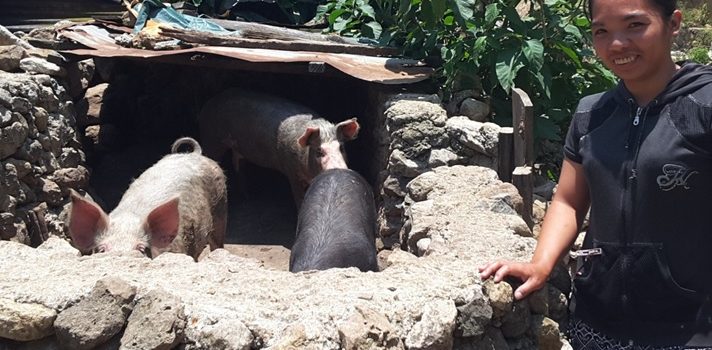 A young lass from Mainit, Bontoc, Mountain Province shows off her fattened swine (Photo by Emiliana Balagtas, PSO)
A young lass from Mainit, Bontoc, Mountain Province shows off her fattened swine (Photo by Emiliana Balagtas, PSO) Mainit’s swine fattening gets hotter with PRDP intervention, RAEB results show
Swine fattening and marketing is now a hit in Mainit, Bontoc, Mountain Province, adding to the livelihood heat in this far flung municipality as more farmers engage in this profitable enterprise.
A Rapid Appraisal of Emerging Benefits (RAEB) activity was conducted recently by a monitoring team from the DA PRDP, showing that that there is an increase in average household income by 70.54%; increase in marketed output by 321.02%; and an increase in the average volume of production by 350% as gleaned from the highlights of accomplishment report of the Project Support Office as of June, 2019.
Looking Back
When the super typhoon Lando passed through Mainit, Bontoc, Mountain Province in 2015, the farmers suffered major livelihood losses. Just like their counterparts in most parts of the Cordillera region who suffered losses in terms of damages to major crops and livestock, the farmers in Mainit and the municipality of Bontoc reported that the typhoon damaged most of their livelihood destroying three hectares planted with basic vegetables and four hectares banana and coffee plantations.
Some months later, the DA through the PRDP offered a short term recovery intervention in the form of Small Livelihood Project (SLP) scheme under the Enterprise Development (I-REAP) component of the project to calamity-stricken small scale farmers and fishers nationwide. Through this SLP, the PRDP will fund projects to provide sustainable income-generating activities to farmers and fisherfolk through interventions that would quickly respond to their basic needs and restore their lost livelihood. SLPs are now identified as microenterprise subprojects.
After a year of struggling to recover such losses, the Kavining-an Livelihood Association, a group of farmers from Mainit, Bontoc, Mountain Province proposed for an income-generating livelihood enterprise in the form of swine fattening and marketing which they considered a sustainable income-generating livelihood after losing their crops and livestock to the typhoon.
New hope for recovery
The PRDP then approved the “Swine Fattening and Marketing” enterprise worth P1 million with fund sharing distributed as follows: Loan Proceeds from the Word Bank (60%), Government of the Philippines (20%), Local Government Unit (20%), plus Equity from the Association (20%).
The project provided an initial stock of 200 heads of 45-day-old upgraded piglets plus materials for the fermentation of organic feeds to introduce a new system of feeding to members of the association who received five heads each in two tranches. It was said to generate jobs for women and out-of-school youth in the municipality. Moreover, the project was said to ensure a continuous supply of organic pork in the locality, eventually increasing the income of these calamity-stricken farmers after recovery of economic losses.
The proposed scheme requires recipients of live piglets to be fattened for at least six months with feeds that are organic, made of a fermented mixture of feeds and locally available edible weeds, chopped banana stalk and camote leaves. After six months, the pigs are sold on live-weight basis with at least 90 kg body weight after which and an amount equivalent to the pigs buying price plus P50 pesos per pig as project capital buid-up and P5.00 per head as service fee is to be remitted to the Association for sustainability of continuity.
The business plan of this subproject projected a meager income addition of barely 26% by the end of one cycle.
Big Leap
However after the RAEB activity, the assessment came up with a result that shows a big leap in terms of income for the association. From P78, 997.50 in 2016 to P134, 723.10 in 2018 after PRDP intervention, the association’s’ income increased by 70.54%.
One of PRDP’s project development objective is to raise the income of households by at least 5%.
The RAEB also came up with emerging benefits in terms of marketing. After implementing the PRDP project, an assured market was put into place, there was an increase in price, easier payment scheme and ease in delivery, among others, according to the beneficiaries.
The changes observed, the report says, is that there is an increase in the number of heads raised for fattening in the municipality. More farmers became swine growers, more than 50% of which are women, and their swine feeding practices has reportedly improved with the provision of trainings. With the PRDP intervention, the beneficiaries learned to produce silage as supplemental feeds, care and maintenance was said to have improved, use of other feeding materials has become a new practice, and they have felt the assistance of the DA and LGU with marketing their products aside from care and maintenance.
To date, the income of swine producers in Mainit has increased, thanks to all learnings and interventions provided by PRDP. The swine fever surely continues to flow on alongside the hot spring water in this municipality with more than 80% of which is said to be attributed to the PRDP.
The PRDP is a six-year project designed to establish the government platform for a modern, climate-smart and market-oriented agri-fishery sector. It wants to ensure sustenance for farmers, increased productivity and reduced vulnerability, improved services and diversified livelihood support is pushed. ### Ma. Imelda Isabel B. Zabala (DA PRDP RPCO-CAR)
